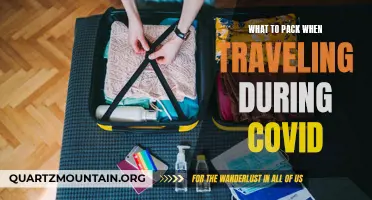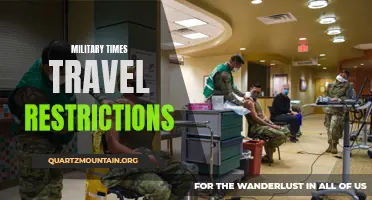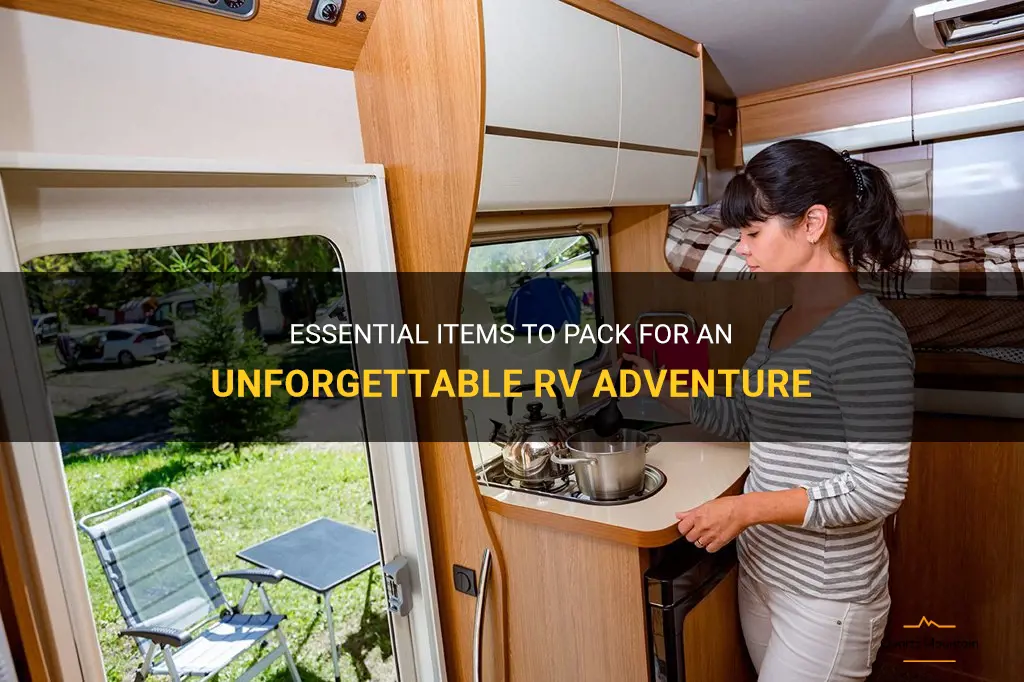
Are you ready for the ultimate road trip experience? If you're planning on embarking on an unforgettable RV adventure, it's important to make sure you pack the essential items. From practical necessities to fun accessories, we've got you covered. Whether you're a seasoned RVer or a first-timer, this comprehensive guide will ensure that your journey is comfortable, convenient, and most importantly, unforgettable. So, buckle up and get ready to hit the open road with these must-have items for your RV adventure.
What You'll Learn
- What are the essential items to pack in an RV for a camping trip?
- How do I determine what food and cooking supplies to pack for an RV trip?
- What kind of clothing should I pack for different weather conditions in an RV?
- Are there any specific tools or equipment that should be included when packing for an RV trip?
- What safety items should be packed in an RV for emergencies or unexpected situations?

What are the essential items to pack in an RV for a camping trip?
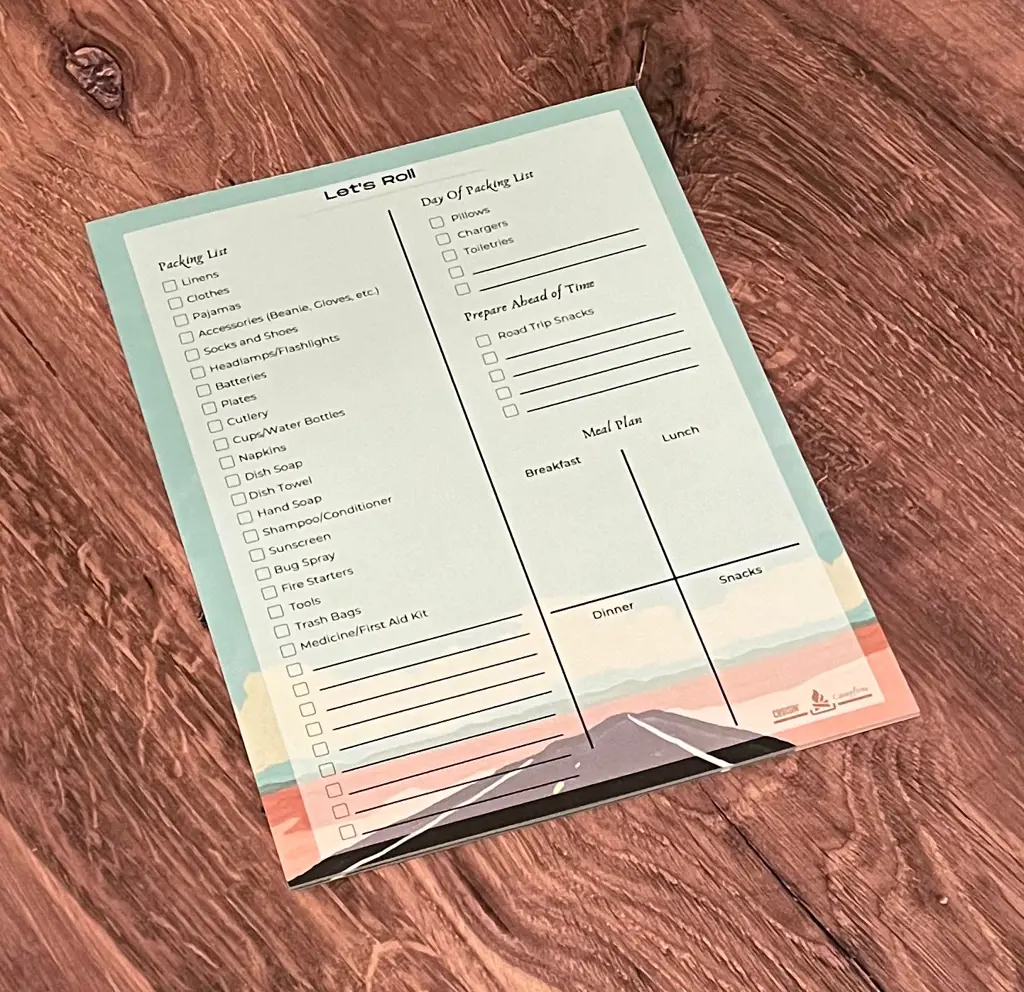
When you're heading out on a camping trip in your RV, it's essential to pack the right items to ensure a comfortable and enjoyable experience. Whether you're a seasoned camper or new to the RV lifestyle, here's a guide on the essential items you should pack for your next adventure.
Camping Gear:
- Tent: While you have the luxury of an RV, it's always a good idea to carry a tent as a backup or for additional sleeping space.
- Sleeping bags and pillows: Make sure to pack warm, comfortable sleeping bags and pillows for a good night's sleep.
- Camping chairs and table: These portable items are perfect for lounging outside your RV or having meals in the great outdoors.
- Camp stove and cookware: Bring a compact camp stove and cookware for cooking meals outside your RV. This will give you the freedom to cook different dishes and enjoy the camping experience.
- Lanterns and flashlights: Essential for illuminating your campsite at night, lanterns and flashlights are a must-have item.
RV Essentials:
- Cleaning supplies: Bring cleaning supplies such as dish soap, sponges, and trash bags to keep your RV tidy throughout your trip.
- Bed and bath linens: Pack sheets, blankets, and towels for your RV's beds and bathroom.
- Toiletries and personal items: Don't forget to pack your everyday toiletries and personal items such as toothpaste, shampoo, and medications.
- Kitchen supplies: Stock your RV's kitchen with essential items like plates, utensils, pots, and pans.
- RV tools and spare parts: It's always a good idea to have basic tools and spare parts on hand in case of any mechanical issues.
Outdoor Essentials:
- Outdoor clothing: Dress appropriately for the weather conditions at your campground. Bring clothing that can be layered for varying temperatures.
- Hiking gear: If you plan to go hiking, don't forget to pack hiking boots, a backpack, and a map or GPS device.
- Insect repellent: Keep pesky bugs at bay by packing insect repellent for both your body and your RV.
- First aid kit: Carry a well-stocked first aid kit that includes bandages, antiseptic ointment, and any necessary medications.
Food and Drinks:
- Non-perishable food items: Pack a variety of non-perishable food items such as canned goods, dried fruits, granola bars, and instant meals. These will come in handy when you don't have access to fresh groceries.
- Snacks: Don't forget to bring your favorite snacks for those moments when you need a quick pick-me-up.
- Drinking water: Carry an ample supply of bottled water for drinking and cooking.
- Cooler: Bring a cooler to store perishable food items and keep them fresh during your trip.
Entertainment and Miscellaneous:
- Books, board games, or playing cards: Have some entertainment options on hand for when you want to relax and unwind.
- Camping chairs and a portable grill: Bring camping chairs and a portable grill for outdoor cooking and relaxation.
- Maps and guidebooks: Carry maps and guidebooks of the area you plan to visit to help you navigate and explore your surroundings.
- Cash and cards: Ensure you have enough cash and cards for any expenses or emergencies that may arise.
By packing these essential items, you'll be well-prepared and able to fully enjoy your camping trip in your RV. Remember to plan your meals and activities ahead of time to make the most of your outdoor adventure. Happy camping!
The Ultimate Guide to Packing Books Safely for Moving or Storage
You may want to see also

How do I determine what food and cooking supplies to pack for an RV trip?
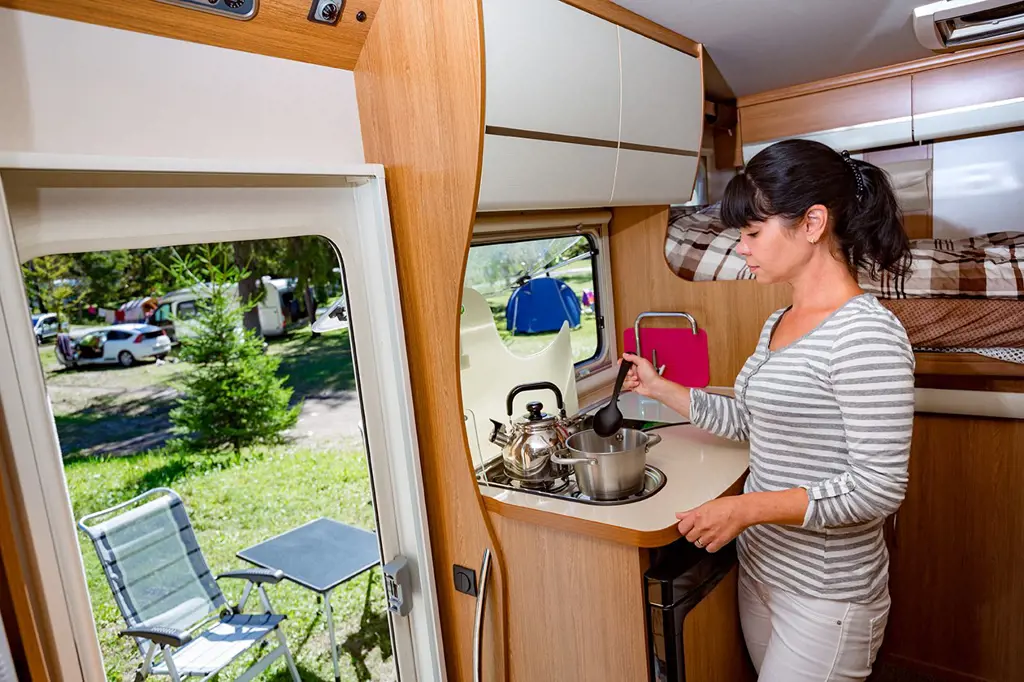
RV trips are a popular way to explore the great outdoors and enjoy the freedom of the open road. When planning for an RV trip, one important aspect to consider is what food and cooking supplies to pack. This can often be a challenging task, as space in an RV is limited and you want to make sure you have everything you need to prepare meals while on the road. In this article, we will discuss how to determine what food and cooking supplies to pack for an RV trip.
- Plan your meals in advance: Before embarking on your RV trip, take the time to plan out your meals for each day. This will help you determine what ingredients and cooking supplies you will need to bring along. Consider the number of people on the trip, their dietary restrictions, and the duration of your journey. Make a list of the recipes you intend to prepare and the necessary ingredients.
- Consider storage limitations: RVs typically have limited storage space, so it's essential to be mindful of the space you have available. Opt for compact and lightweight cooking supplies that can fit easily in your RV's kitchen area. Look for collapsible cookware, nesting pots and pans, and folding utensils to maximize space. Prioritize essential items like a stove, pots, pans, knives, cutting board, and a can opener.
- Pack non-perishable and versatile food items: When it comes to food, choose items that are non-perishable and versatile. This will help minimize the need for refrigeration and allow you to prepare a variety of meals. Canned goods, dried fruits, nuts, and jerky are great options for snacks and easy meals. Rice, pasta, quinoa, and canned beans can be used as a base for many different dishes. Don't forget to pack cooking staples like olive oil, spices, and condiments.
- Bring a variety of cooking methods: RVs usually come equipped with a propane stove, but it's a good idea to bring along alternative cooking methods as well. Consider packing a portable grill, a camping stove, or even a slow cooker. This will provide you with more flexibility in how you cook your meals and allow you to enjoy outdoor cooking when weather permits.
- Don't forget about hygiene and cleanliness: Along with food and cooking supplies, it's crucial to pack items that will help you maintain hygiene and cleanliness while on the road. This includes hand sanitizer, dish soap, dish towels, and cleaning supplies. Remember to bring garbage bags to dispose of waste properly.
- Make a checklist and double-check before leaving: To ensure you don't forget any essential items, create a checklist of all the food and cooking supplies you plan to pack. Before leaving for your trip, go through the list and double-check that you have everything you need. This will help avoid any last-minute surprises or disappointments.
In conclusion, determining what food and cooking supplies to pack for an RV trip requires careful planning and consideration. By planning your meals in advance, considering storage limitations, packing non-perishable and versatile food items, bringing a variety of cooking methods, and remembering to prioritize hygiene and cleanliness, you can ensure that you have everything you need to enjoy delicious meals while on the road in your RV.
Essential Items to Pack for Your Trip to Belize
You may want to see also

What kind of clothing should I pack for different weather conditions in an RV?
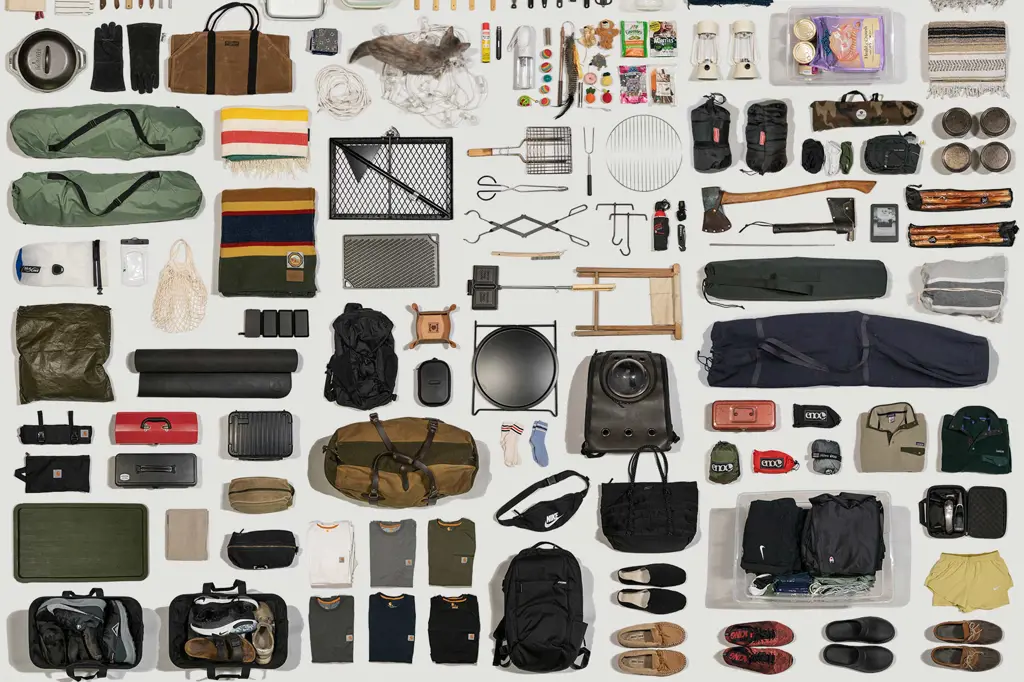
When planning an RV trip, it's important to pack the appropriate clothing for the weather conditions you'll encounter along the way. Whether you're traveling through sunny deserts, snowy mountains, or rainy forests, having the right clothing can make a significant difference in your comfort level. Here are some tips on what kind of clothing to pack for different weather conditions in an RV.
Sunny and Warm Weather:
If you'll be traveling through areas with hot and sunny weather, it's crucial to pack lightweight and breathable clothing. Opt for loose-fitting t-shirts, tank tops, and shorts made from materials like cotton or linen. These fabrics will help to keep you cool and allow air to circulate around your body. Additionally, don't forget to pack a wide-brimmed hat and sunglasses to protect yourself from the sun's harmful rays.
Cold and Freezing Weather:
If you're embarking on an RV trip during the winter or traveling to colder regions, it's essential to pack warm and insulating clothing. Layering is key in this type of weather. Start with a moisture-wicking base layer, such as thermal underwear, to keep your body dry and retain heat. Add a mid-layer, such as a fleece or wool sweater, for extra warmth. Finally, top it off with a waterproof and insulated jacket to protect yourself from wind and snow. Don't forget to pack a warm hat, gloves, and thick socks to keep your extremities warm as well.
Rainy and Wet Weather:
When traveling to areas prone to rain or visiting during the rainy season, it's important to pack clothing that will keep you dry. A waterproof rain jacket with a hood is a must-have item. Look for jackets made from materials like Gore-Tex, which provides excellent protection against rain while remaining breathable. Pair your rain jacket with waterproof pants or a rain skirt to keep your lower body dry as well. Additionally, pack quick-drying shirts and pants made from synthetic materials like nylon or polyester, as these fabrics won't absorb moisture like cotton does.
Variable Weather Conditions:
If you'll be traveling through regions with unpredictable weather or significant temperature fluctuations, it's wise to pack a mix of clothing items that can be layered and easily adjusted. Look for versatile pieces like convertible pants that can be converted into shorts or long-sleeve shirts that can be rolled up and secured with tabs. This way, you can adapt to the changing weather conditions without overpacking.
Examples:
Here are a few examples of clothing items you might consider packing for different weather conditions in an RV:
- Sunny and warm weather: t-shirts, tank tops, shorts, sun hat, sunglasses.
- Cold and freezing weather: thermal underwear, fleece or wool sweater, insulated jacket, warm hat, gloves, thick socks.
- Rainy and wet weather: waterproof rain jacket, waterproof pants or rain skirt, quick-drying shirts and pants.
- Variable weather conditions: convertible pants, long-sleeve shirts with roll-up tabs.
Remember to check the weather forecast for your destination before packing and adjust your clothing accordingly. It's always better to be overprepared than underprepared when it comes to dressing for different weather conditions in an RV. By following these tips and packing the appropriate clothing, you'll ensure a comfortable and enjoyable trip, no matter the weather.
Essential Packing List for a January Trip to Europe
You may want to see also

Are there any specific tools or equipment that should be included when packing for an RV trip?
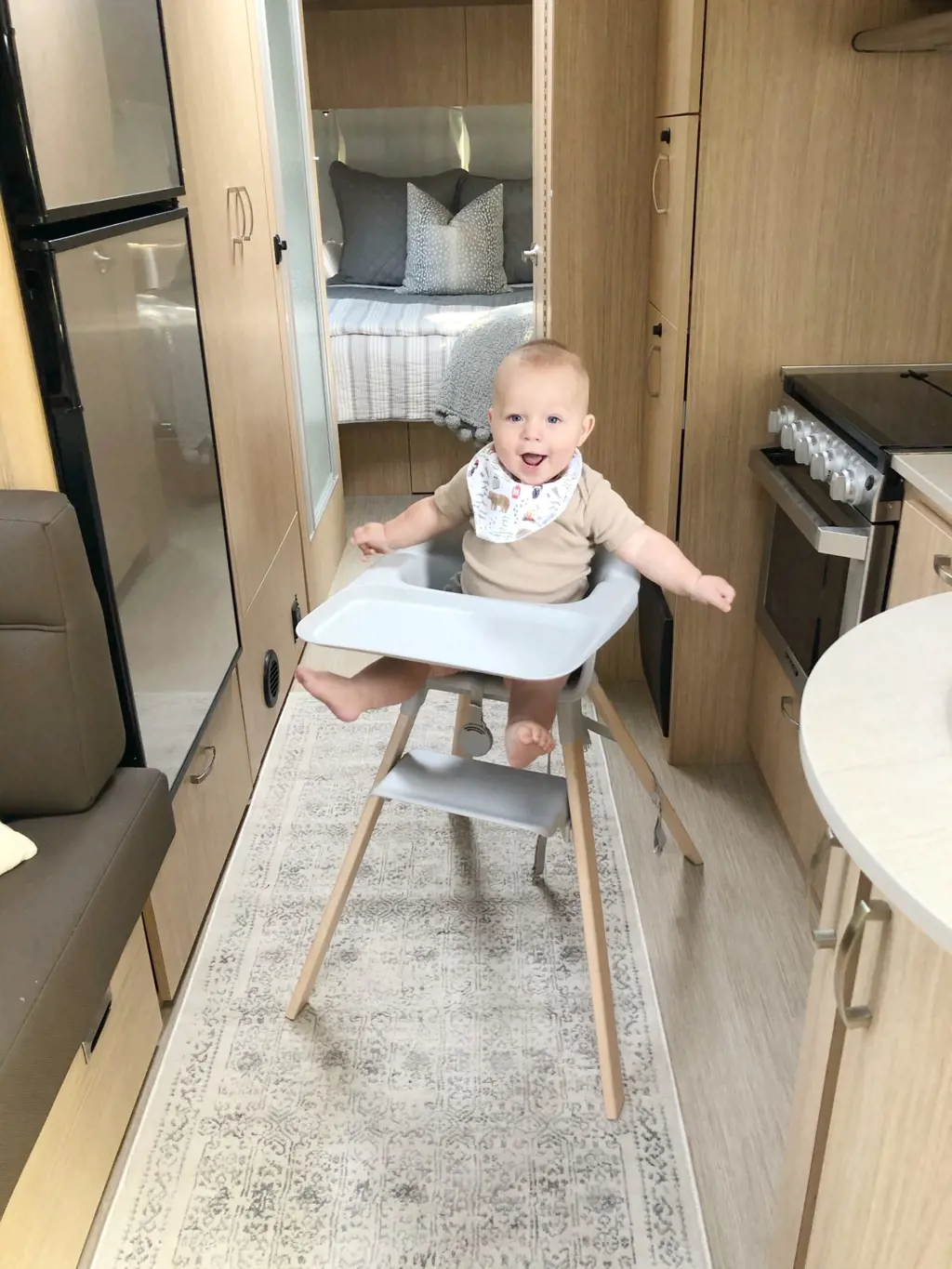
When preparing for an RV trip, it's important to pack the right tools and equipment to ensure a smooth and enjoyable journey. Whether you're a seasoned RVer or a first-time traveler, having the necessary tools can make all the difference in your trip. In this article, we will discuss the specific tools and equipment that should be included when packing for an RV trip.
One essential tool that should be included in your RV kit is a set of basic hand tools. This should include items such as screwdrivers, wrenches, pliers, and a multi-purpose tool. These tools will come in handy for small repairs and adjustments that may need to be made while on the road. It's also a good idea to pack a small tool kit specifically for your RV, as it may have unique components that require specialized tools.
Another important item to include in your RV packing list is a portable tire inflator. Flat tires can occur at any time, and having a tire inflator handy can save you from being stranded on the side of the road. Look for a portable tire inflator that is compatible with your RV's tires and can be powered by either your RV's battery or a separate power source.
In addition to tools, it's also crucial to pack essential safety equipment for your RV trip. This includes a fire extinguisher, a first aid kit, and a roadside emergency kit. These items can provide peace of mind and ensure you are prepared for any unexpected situations that may arise.
Furthermore, it's important to pack equipment for your RV's exterior maintenance. This includes a ladder for accessing the roof of your RV, as well as cleaning supplies for washing the exterior. Keeping your RV clean and well-maintained not only improves its overall appearance but also helps prevent long-term damage from dirt, debris, and weather elements.
When it comes to packing for an RV trip, it's also necessary to include equipment for your interior comfort and convenience. This can include items such as bedding, cooking utensils, and camping chairs. Depending on the length of your trip and your individual needs, you may also want to pack appliances such as a portable grill or a coffee maker.
Lastly, don't forget to pack any specific equipment or tools that are unique to your RV's individual features. For example, if your RV has a slide-out, make sure to pack the appropriate tools for operating and maintaining it. If you have a generator, be sure to include any necessary fuel or accessories.
To summarize, when packing for an RV trip, it's important to include a set of basic hand tools, a portable tire inflator, safety equipment, equipment for exterior maintenance, equipment for interior comfort, and any specific tools or equipment unique to your RV. By having these items on hand, you'll be well-prepared for any situation that may arise during your journey. Remember, it's always better to be over-prepared than to find yourself lacking the essential tools and equipment needed to enjoy your RV trip to the fullest.
Essential Items for Traveling with an Infant on a Plane
You may want to see also

What safety items should be packed in an RV for emergencies or unexpected situations?
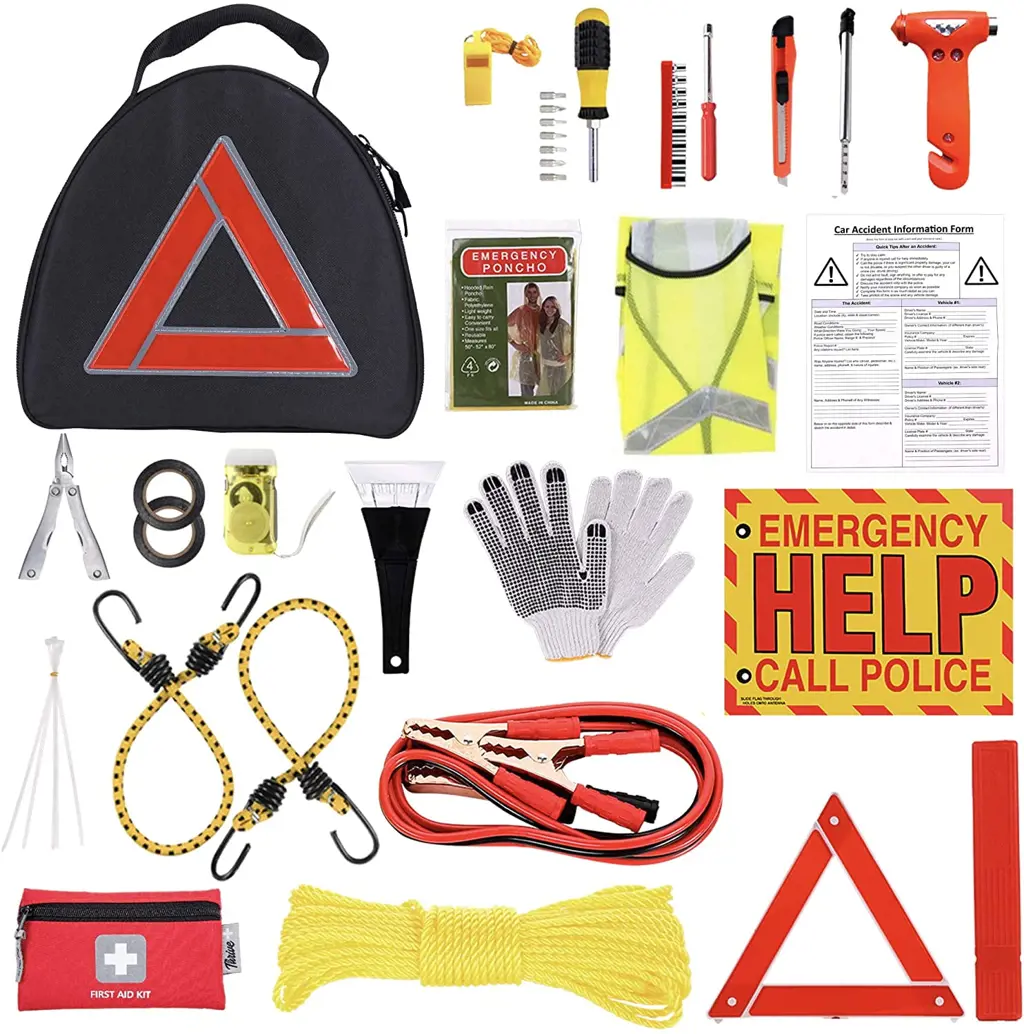
Emergencies and unexpected situations can happen at any time, no matter how prepared you are. When you are traveling in an RV, it is important to have a well-stocked emergency kit to ensure you can handle any situation that arises. Here are the essential safety items that should be packed in an RV for emergencies or unexpected situations.
- First Aid Kit: A basic first aid kit is an absolute necessity for any RV trip. It should include items such as bandages, antiseptic wipes, adhesive tape, gauze pads, tweezers, scissors, and pain relievers. Make sure to also pack any necessary prescription medications for you and your family.
- Fire Extinguisher: RVs can be prone to fires due to their compact nature and the presence of flammable materials such as gasoline and propane. It is crucial to have a fire extinguisher on board that is specifically designed for RV use. Make sure to check the expiration date and ensure it is easily accessible in case of an emergency.
- Tire Repair Kit: Flat tires can happen when you least expect them, and having a tire repair kit on hand can save you from getting stranded on the side of the road. A tire repair kit should include a tire gauge, tire sealant, and a portable air compressor. Additionally, you should also have a spare tire and the necessary tools to change it.
- Emergency Food and Water: In the event that you become stranded or unable to access food and water, it is essential to have an emergency supply on hand. Pack non-perishable food items such as canned goods, protein bars, and dried fruits. You should also have an ample supply of bottled water for drinking and hygiene purposes.
- Flashlights and Batteries: Power outages can occur during emergencies or unexpected situations. Having multiple flashlights and extra batteries will ensure you have a reliable source of light. Additionally, consider packing a headlamp for hands-free illumination.
- Emergency Blankets: In case of extreme weather conditions, it is important to have emergency blankets to keep warm. These blankets are lightweight and compact, making them easy to store in your RV.
- Tools and Equipment: Having a basic set of tools can be handy in emergencies. Pack a set of screwdrivers, wrenches, pliers, and duct tape. Additionally, include a Swiss Army knife or multi-tool that can serve multiple purposes.
- Roadside Safety Equipment: It is important to be visible and alert while dealing with roadside emergencies. Pack reflective triangles or flares to warn oncoming traffic. You should also have a reflective vest or brightly colored clothing to increase visibility.
- Communication Devices: In case of emergencies, it is crucial to have a way to communicate with emergency services or loved ones. Carry a fully charged cell phone with a car charger, a CB radio, or a satellite phone for remote areas with no cellular coverage.
- Personal Protection Items: When unexpected situations arise, personal protection items such as pepper spray, a whistle, or a personal alarm can provide added security. It is always better to be proactive and prepared for any unfortunate circumstances.
Remember to regularly check and update your emergency kit to ensure all items are in good working condition and not expired. Proper preparation and packing of these safety items will greatly enhance your ability to handle emergencies or unexpected situations while traveling in an RV. Stay safe and have a worry-free journey!
Essential Items to Pack for a Lake House Retreat
You may want to see also
Frequently asked questions
When it comes to packing kitchen supplies for your RV, it's important to bring the essentials. This includes plates, bowls, utensils, pots and pans, cooking utensils, cutting board, and a can opener. Don't forget to also pack basic pantry items like salt, pepper, and cooking oil. It's also a good idea to bring storage containers for leftovers and Ziploc bags for storing food.
When packing bedding for your RV, it's best to keep it simple. Opt for lightweight and easily storable bedding such as sleeping bags or compact blankets. You can also bring pillows and fitted sheets for added comfort. Consider packing a mattress topper for extra cushioning if needed. It's also important to pack enough bedding to accommodate the number of people traveling in your RV.
When it comes to toiletries for your RV trip, you'll want to bring the basics. This includes toothpaste, toothbrushes, shampoo, conditioner, soap or body wash, toilet paper, and towels. Don't forget any specific personal care items you may need, such as contact lens solution, medications, or sunscreen. It's also a good idea to pack a small first aid kit for any minor injuries or emergencies.
If you plan on enjoying outdoor activities during your RV trip, it's important to pack accordingly. Be sure to bring items such as camping chairs, hammocks, portable grills, and coolers for picnics and barbecues. Don't forget to pack outdoor games like frisbees or cornhole for added entertainment. It's also a good idea to pack hiking boots, swimsuits, and outdoor clothing suitable for the climate and terrain of your destination.
It's always wise to be prepared for any emergencies that may arise during your RV trip. Some essential tools and equipment to pack include a basic tool kit, jumper cables, tire pressure gauge, spare tire, emergency road flares, and a fire extinguisher. It's also a good idea to have a portable generator or solar charger on hand for backup power. It's important to regularly check and maintain these emergency items to ensure they are in good working condition before your trip.






